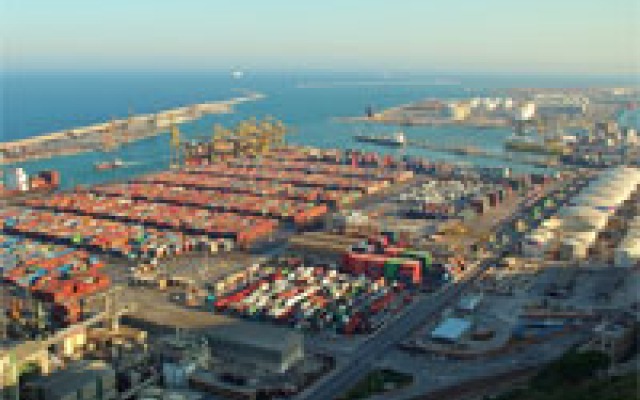research
Latest CREMed research project examines relationship between trade, environment and transport in Euro-Mediterranean area

A comprehensive new study from researchers at the Center for Research in the Economies of the Mediterranean (CREMed) examines the relationship between trade, environment and transport and offers some interesting recommendations for Euro-Mediterranean policy makers.
Created in 2008 by the Barcelona School of Economics (BSE) and the European Institute of the Mediterranean (IEMed), CREMed's objective is to promote high quality economic research with a special focus on the Mediterranean region, and in particular the economic relationships between the European Union and Mediterranean countries.
The latest CREMed research project,"International trade, transport and the environment in the Euro-Med Area," is a collaboration between academics in Catalonia and Tunisia, both gateways of the Mediterranean. The project's directors were Prof. Inmaculada Martínez-Zarzoso (Georg-August University of Göttingen and the Institute of International Economics at Universitat Jaume I) and Prof. Sami Bensassi (Universitat Jaume I).
Other participants in the research project were:
- Prof. Leila Baghdadi
LIM-MAS Polytechnic School of Tunisia, University of 7th November at Carthage, Tunisia
- Prof. Laura Márquez-Ramos and Prof. Celestino Suárez-Burguet
Department of Economics and Institute of International Economics at Universitat Jaume I
- Prof. Habib Zitouna
FSEGN and LIM-MAS Polytechnic School of Tunisia, University of Carthage, Tunisia
The thesis defended in the project is that while trade has increased between the two shores of the Mediterranean and has deepened economic integration between North and South, this process of integration has not been accompanied by a homogenization of environmental legislation of different countries. This can have a negative impact.
The main results indicate that countries participating in trade agreements are converging with their northern neighbors in terms of CO2 emissions, and that they are doing so more quickly than countries that do not participate in these agreements. Moreover, the research revealed that the impact of transport in the generation of pollution is a complex issue. When the volume of trade is taken into consideration, it turns out that regional trade generates more pollution than global trade.
Final recommendations of the project
Recommendation 1:
The EU needs to develop a more detailed environmental framework that must be added to the negotiation of trade agreements. In particular, European companies should be subject to similar environmental legislation or equivalent when they locate their business in countries with which the EU has an integration agreement.
Recommendation 2:
Support from the European Commission for maritime transport seems to be the most sustainable way to develop trade in the region. However, it should also support the creation of infrastructure for more efficient local transport, or the need to control local emissions of Mediterranean ports.
Professors Baghdadi, Bensassi and Martínez-Zarzoso presented a related paper at the Second Workshop on the Economies of the Mediterranean and the Euro-mediterranean Process held at CREMed last spring. At the First Workshop on the Economies of the Mediterranean and the Euromediterranean Process (July 2010), Profs. Bensassi, Márquez-Ramos and Martínez-Zarzoso presented some previous work on a related issue. That paper, entitled "Economic integration and the two margins of trade: An application to the Euro-Mediterranean agreements" was also the winner of the 2010 edition of the CREMed Best Paper Award. In November 2011, the paper was published in the Journal of African Economies (Oxford University Press).
Project publications
Project executive summary [pdf]
The Geography of Trade and the Environment: The case of CO2 emissions
by S. Bensassi (Universitat Jaume I), Laura Márquez-Ramos (Universitat Jaume I), I. Martínez-Zarzoso (Universitat Jaume I, University of Goettigen, Germany), H. Zitouna (University of Carthage, Tunisia). October, 2011.
by L. Baghdadi (University of 7th November at Carthage, Tunisia and Tunis University), I. Martínez-Zarzoso (Universitat Jaume I, University of Goettigen, Germany), C. Suárez (Universitat Jaume I), H. Zitouna (FSEGN and LIM-MES Polytechnic School of Tunisia, University of Carthage, Tunisia). November 2011.
Other CREMed research projects currently in progress
Moroccans’ Assimilation in Spain: Family-Based versus Labor-Based Migration
Principal investigator:
Prof. Núria Rodríguez-Planas
(UAB and BSE, CREMed)
Business cycles in the Mediterranean basin: the role of remittances, tourism and institutions
Principal investigator:
Prof. Fabio Canova
(ICREA-UPF, BSE, CREMed)
International research team:
Prof. Matteo Ciccarelli (ECB)
Prof. Sumru Altug (Koç University)
Prof. Evi Pappa (UAB, BSE)
Prof. Vangelis Vassillatos (Athens University of Economics and Business)
